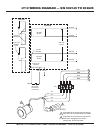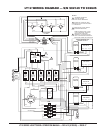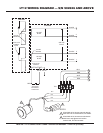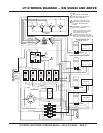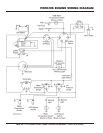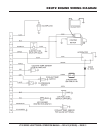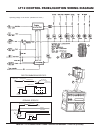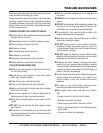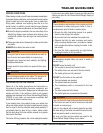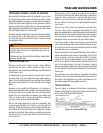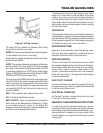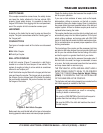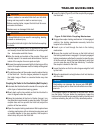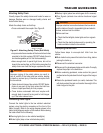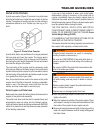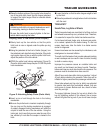
PAGE 54 — LT12 SERIES LIGHT TOWER • OPERATION MANUAL — REV. #12 (01/20/09)
DRIVING CONDITIONS
When towing a trailer, you will have decreased acceleration,
increased stopping distance, and increased turning radius
(which means you must make wider turns to keep from
hitting curbs, vehicles, and anything else that is on the
inside corner). In addition, you will need a longer distance
to pass, due to slower acceleration and increased length.
Be alert for slippery conditions. You are more likely to be
affected by slippery road surfaces when driving a tow
vehicle with a trailer, than driving a tow vehicle without
a trailer.
Check rearview mirrors frequently to observe the trailer
and traffi c.
NEVER drive faster than what is safe.
COUPLING TO THE TOW VEHICLE
Follow all of the safety precautions and instructions in
this manual to ensure safety of persons, equipment, and
satisfactory life of the trailer. Always use an adequate tow
vehicle and hitch. If the vehicle or hitch is not properly
selected and matched to the Gross Vehicle Weight Rating
(GVWR) of your trailer, you can cause an accident that
could lead to death or serious injury.
If you already have a tow vehicle, know your vehicle tow
rating and make certain the trailer’s rated capacity is less
than or equal to the tow vehicle’s rated towing capacity. If
you already have (or plan to buy) a trailer, make certain
that the tow rating of the tow vehicle is equal to or greater
than that of the trailer.
The trailer VIN tag contains the critical safetyinformation
WARNING
Driving too fast for severe road conditions can result in
loss of control and cause death or serious injury.
Decrease your speed as road, weather, and lighting
conditions deteriorate.
Always check for local trailer tow speed limits in your
area.
WARNING
Do not transport people on the trailer. The transport of
people puts their lives at risk and may be illegal.
for the use of your trailer. Again, be sure your hitch and tow
vehicle are rated for the Gross Vehicle Weight Rating of
your trailer.
WARNING
Proper selection and condition of the coupler and hitch
are essential to safely towing your trailer. A loss of
coupling may result in death or serious injury.
Be sure the hitch load rating is equal to or greater •
than the load rating of the coupler.
Be sure the hitch size matches the coupler size.•
Observe the hitch for wear, corrosion and cracks •
before coupling. Replace worn, corroded or cracked
hitch components before coupling the trailer to the
tow vehicle.
Be sure the hitch components are tight before •
coupling the trailer to the tow vehicle.
WARNING
An improperly coupled trailer can result in death or
serious injury.
DO NOT move the trailer until:
The coupler is secured and locked to hitch.•
The safety chains are secured to the tow vehicle.•
The trailer jack(s) are fully retracted.•
DO NOT tow the trailer on the road until:
Tires and wheels are checked.•
The trailer brakes are checked.•
The breakaway switch is connected to the tow •
vehicle.
The load is secured to the trailer.•
The trailer lights are connected and checked.•
WARNING
Use of a hitch with a load rating less than the load rating
of the trailer can result in loss of control and may lead
to death or serious injury.
Use of a tow vehicle with a towing capacity less than
the load rating of the trailer can result in loss of control,
and may lead to death or serious injury.
Be sure your hitch and tow vehicle are rated for the
Gross Vehicle Weight Rating of your trailer.
TRAILER GUIDELINES



